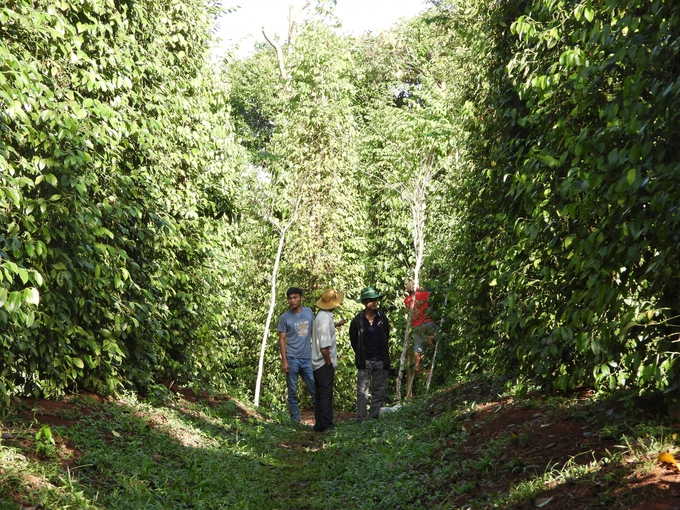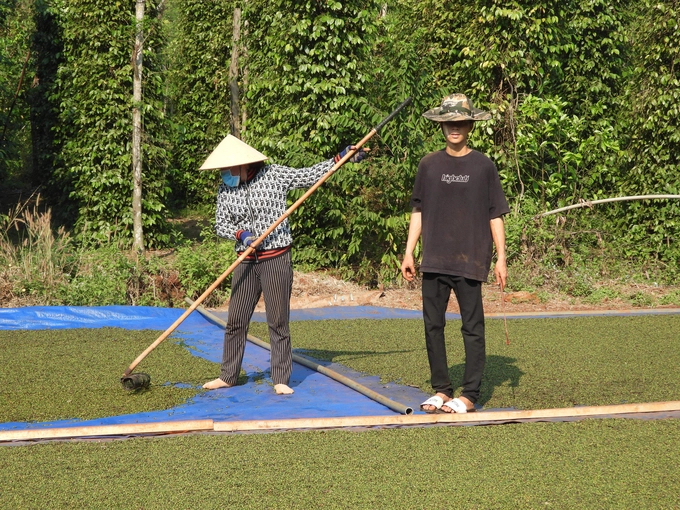May 24, 2025 | 07:55 GMT +7
May 24, 2025 | 07:55 GMT +7
Hotline: 0913.378.918
May 24, 2025 | 07:55 GMT +7
Hotline: 0913.378.918

Organic pepper garden of Binh Phuoc Organic Agriculture Cooperative in Dak O commune. Photo: Tran Trung.
In Binh Phuoc province, Bu Gia Map district has advantages in land and climate. Binh Phuoc Organic Agriculture Cooperative in Dak O Commune has chosen to develop organic pepper to start production and business activities.
Thanks to close cooperation and association with Nedspice Vietnam Spices Processing Company Limited ('Nedspice Company'), with nearly 100 members, of which 29 members with a total area of almost 60 hectares of pepper are certified organic, all the remaining members with an area of hundreds of hectares also maintain organic and sustainable production (RA standard).
Mr. Mai Hien Huy, Chairman and Director of Binh Phuoc Organic Agriculture Cooperative, shared that the cooperative learned about the technical process of organic pepper cultivation and trained its members. The most important thing for farmers when growing organic pepper is to follow the process and closely monitor each other. Up to now, farmers who grow organic pepper have achieved a yield of over 4 tons/ha.
According to Mr. Huy, farmers often thought applying a lot of fertilizers and pesticides was good in the past. Still, it caused excess, the plants did not absorb it all, and it negatively affected the environment and health.
The cooperative has wholly converted to organic fertilizers and biological pesticides. Before that, the cooperative checks thoroughly and then allows putting the products and materials into cultivation to ensure that all gardens meet the requirements of organic farming and that all farmers comply with the production process.
"We assess the organic certification for the cooperative as a whole, not each household, so when people test more than 800 banned substances, if a farmer discovers chemicals during the test, he will be immediately disqualified. At that time, the whole cooperative has to bear the same damage, "emphasized Mr. Huy.
Mr. Nguyen Van Luan is one of the first farmers of the cooperative to participate in organic pepper cultivation. He is currently the Vice Chairman of the cooperative's Board of Directors, adding that his family has had 4.5ha of certified organic pepper for over a year.
According to Mr. Luan, at the beginning of the transformation to self-sufficiency, people faced many difficulties, spending up and down, and investment problems were also high. However, after some time, the soil gradually recovered, the nutrients in the ground were steadily improved, the pepper plants grew healthy, had good disease resistance, and the yield was stable.
To achieve the above results and his own experience, Luan and his members were also guided by the cooperative and the Nedspice Company. People initially received it with a bit of surprise, but after grasping all the techniques, they found it very easy, and the prices and profits were higher.

Thanks to organic farming, the pepper output of the cooperative next year is always higher than the previous year. Photo: Tran Trung.
Although newly established and operating for over two years, Binh Phuoc Organic Agriculture Cooperative has initially achieved success in production and business. In 2022, the cooperative sold more than 100 tons of organic pepper at high prices, earning tens of billions of dong.
"This year's output will be about 30% higher than last year because of organic farming. Although the yield will decrease initially, the output will increase gradually every year after the garden has stabilized. We expect this crop to reach 150-160 tons of organic, RA-standard pepper currently purchased by Nedspice Company for VND 58,000-59,000/kg.
Our organic pepper this year will gain an added value of VND 17,000 - 20,000/kg, which is a benefit that members directly enjoy when joining the cooperative," said Dinh Van Truong, Deputy Director of the cooperative.
Mr. Truong added that, after two years of being supported by Nedspice Company for organic certification, the cooperative is currently making its documents to evaluate for organic certification. The goal of the cooperative is that after the organic certification is recognized, it will find other partners to increase its competitiveness and research into deep processing of products to help improve the pepper value chain and income for farmers.
Mr. Tran Van Phuong, Deputy Director of Binh Phuoc Department of Agriculture and Rural Development, said linking to produce pepper according to international standards is a trend in pepper-growing households. Because no chemical fertilizers and drugs are used, the production cost of pepper has been significantly reduced. The resale price is much higher than that of conventional products.
"Binh Phuoc Organic Agriculture Cooperative is an essential production model to be replicated in the province. To develop pepper sustainably, bring productivity and high quality, and meet the strict demands of the market in the integration period, the local agricultural industry encourages farmers to pay attention and replicate the organic production model and biological standards, develop sustainable pepper material areas, do not follow the movement, meet the needs of the association with processing enterprises and product consumption", Mr. Tran Van Phuong recommended.
Translated by Ha Phuc

(VAN) The People's Committee of Tra Vinh province has approved an adjustment to the investment policy for the Green Hydrogen Plant project, increasing its area to approximately 52.76 hectares.
![Reducing emissions from rice fields: [2] Farmers’ commitment to the soil](https://t.ex-cdn.com/nongnghiepmoitruong.vn/608w/files/news/2025/05/05/dsc08881jpg-nongnghiep-140632.jpg)
(VAN) Clean rice cultivation model in Thuong Tan commune, Bac Tan Uyen district, is assisting local residents in achieving sustainable agriculture by substantially reducing costs, increasing productivity, and protecting the environment.

(VAN) At the conference to disseminate Resolution No. 68, AgriS introduced its digital agricultural ecosystem and reaffirmed its commitment to accompanying the Government in promoting private sector development and sustainable agriculture.

(VAN) 'Blue Ocean - Blue Foods' initiative is designed to restore marine ecosystems and establish sustainable livelihoods for local communities by cultivating a minimum of 1,000 hectares of cottonii seaweed in the first three years.
/2025/05/21/4642-3-112707_603.jpg)
(VAN) The V-SCOPE project has made direct contributions to three out of six pillars of the Comprehensive Strategic Partnership between Vietnam and Australia.

(VAN) Facing the threat of rabies spreading to the community, Gia Lai province urgently carries out measures to vaccinate dogs and cats on a large scale.

(VAN) Disease-free livestock farming not only protects livestock herds but also stabilizes production and livelihoods for many farmers in Tuyen Quang.